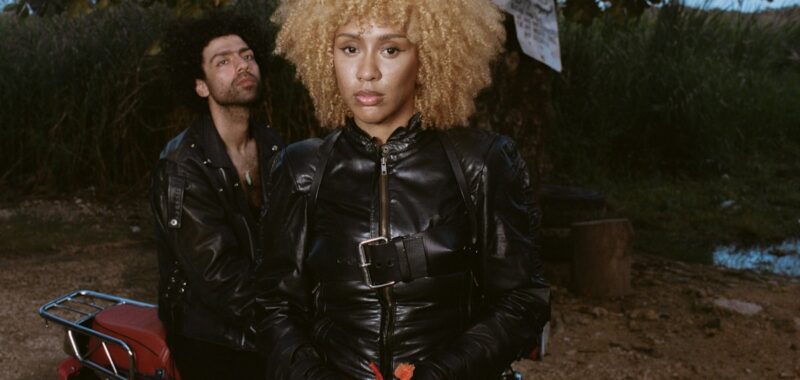Fousheé, the highly versatile artist who is at home in nearly every genre, has a rare asset that cannot be faked: a unique, singular voice. At once airy as a cloud and earthy as a field of wildflowers, Fousheé’s instantly recognizable vocals set her apart—and are what ultimately led to the viral success that catapulted her thriving career. In 2020, a free snippet she gave to Splice, a popular sample library, was used by rapper Sleepy Hallow on his hit song “Deep End.” Fousheé found out about the track with the rest of the world when it went viral on TikTok. After making her own version of the angsty but determined song, she went on to release two critically acclaimed albums and an EP.
She has the other elements of a successful artist, too—sharp lyrics, talented collaborators (and a long list of features with some of the biggest names in music, including Steve Lacy for his 2022 mega-hit “Bad Habit,” for which she won a Grammy. But her ingenuity is at the core of her talent.
Born Britanny Fousheé in early ’90s New Jersey, the artist grew up immersed in music. Her mother was a drummer for PEP, Jamaica’s first all-girl band, and recently, Fousheé made a life-altering trip back to Pointy Heights—a piece of land purchased by her grandfather in the island country, and the name of her third album, out now via RCA.
Where her past projects featured a more riotous, R&B punk sound, Pointy Heights leans all the way into Fousheé’s heritage. Standouts like “war” are pure old-school reggae, bringing to mind greats of the genre like Alton Ellis, Prince Buster (who is sampled on the album) and of course, Bob Marley, whom she repeatedly cites as an influence. There’s still a dreamy, synthy, modern vibe to the album, though—this is no tribute record, but rather a new take on a beloved sound.
Fousheé caught up with W from Milan, where she was in town to attend the MM6 Maison Margiela show, to discuss the serendipitous process of making her new album:
Pointy Heights is such a departure from your past music. What inspired it?
The title is based on my grandfather, who has this mile-long plot of land where he settled in St. Catherine, Jamaica. He built all of the kids’ family homes there. It’s just 30 minutes outside of Kingston—a small, tight-knit community, goats walking around. I returned after not having been since I was a child, and collected all these stories, and reunited with people. I realized the importance of the foundation my grandfather laid and wanted to keep that and the family history alive. I was already making music, but when I went, it affected me so much that I knew I had to shine a light on it somehow.
Foushée at the MM6 Maison Margiela show during Milan Fashion Week spring 2025.
Courtesy of Maison Margiela

So you weren’t planning to make a reggae album at first.
When I make music, it’s feeling first, and then it becomes labeled in genre later. After having toured and performed this heavy palette of emotion, I was ready for a shift. I had to go inside and reground. I knew going back to Jamaica would affect me, but I didn’t know how. I thought I would go, and they would say, “You’re not Jamaican enough, you’ve been gone too long,” and I would be alienated from it. But I felt so connected instead. It was like I never left.
I did have to dig to find out, how do these [different genres] make sense? In that search, I found that it wasn’t such a far stretch—the Second Wave people were mixing that with punk and reggae, and it became a new sound. What I’m doing now is just blending, which is what they’ve been doing even since the beginning of ska, when they were emulating Western soul.
Did your mom being in a band influence you?
Yes, she taped all of her first shows, so watching her perform live is a big memory of mine. She would teach me how to harmonize. The exposure to writers like Bob [Marley], who she would always play and whose lessons I still remember from the lines of the songs, influenced my lyricism.
This album is all you. Was that intentional?
Absolutely. I felt like I had done a lot of features, and sometimes that gets in the way of the music. It overshadows the song. I don’t think people had the chance to really, really get to know me. As scary as it was to not have something to hide behind, I knew that, especially for this one, I wanted for there to be no distractions.
What does your family think of the album?
Everyone’s really excited about it. My uncle has become very popular in his school. He’s a teacher, and all the students are like, “Mr. Moore, I saw you in that video.” There is this sense of pride that they have, which I didn’t expect. But that’s what it’s all for. It’s for them.

